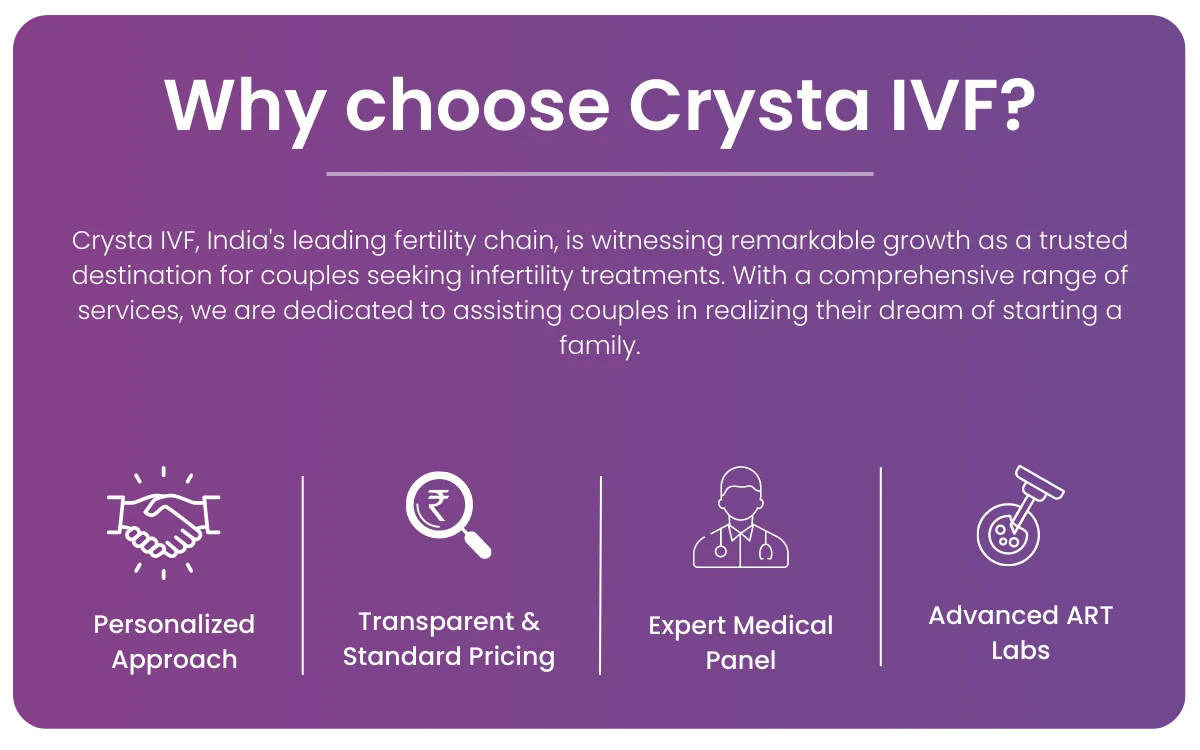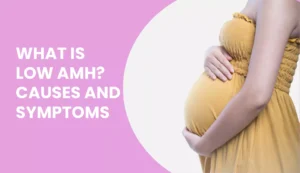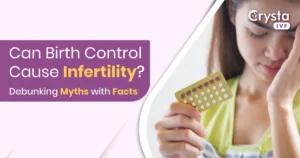Are you struggling to conceive? One of the reasons can be due to blocked fallopian tube. Blocked fallopian tubes are a leading cause of infertility, accounting for more than 25% to 30% of all infertility cases in women. This condition can secretly create problems in natural conception by preventing the sperm from reaching the egg. As blocked fallopian tube symptoms can be subtle or mistaken for other health concerns it often goes unnoticed. From irregular periods to mild pelvic pain, recognizing these signs is the first step toward reclaiming your fertility journey.
With the right guidance and medical support with Crysta IVF, pregnancy is still possible. From lifestyle modifications to high-tech reproductive methods such as IVF, knowing your options for blocked fallopian tube treatment can make all the difference. In this blog, we will walk you through seven steps that can help you overcome this barrier and increase your chances of conceiving.
The connection between blocked fallopian tubes and infertility
Fallopian tube blockage obstructs the passage of the egg and the sperm and prevents the fertilization process from occurring.
When one or both of the fallopian tubes are blocked, it can prevent the sperm from reaching the egg or hinder the fertilized egg from reaching the uterus for implantation.
This can result in difficulty getting pregnant or an increased risk of ectopic pregnancy, where the fertilized egg implants outside the uterus, typically in the fallopian tube.
It can result for various reasons, so let’s delve deeper to understand if getting pregnant with fallopian tube blockage is possible.
Also Read: Blocked Fallopian Tubes: Symptoms, Causes & Treatment
Can you get pregnant with blocked fallopian tubes?
Yes, you can get pregnant even if you are born with only one fallopian tube. However, if any woman’s fallopian tube is blocked due to disease, infection, or inflammation, the chances are higher that the other fallopian tube can also be blocked.
Moreover, if one tube is cut or ligated, the other tube may be patent. In that scenario, you won’t be able to get pregnant. So, to conceive naturally, a fallopian tube must be healthy and freely patent.
Now, let’s study the significant steps that inform us about how to get pregnant with blocked fallopian tubes.
7 Steps to getting pregnant with blocked fallopian tubes
The key procedures for conceiving with obstructed or occasionally damaged fallopian tubes have been covered here.
Step 1. Acknowledge the early symptoms of fallopian tube blockage.
The most common fallopian tube blockage symptoms are:
- Infertility
- Abnormal menstrual cycle
- Previous history of pelvic infection
- Ectopic pregnancy
- Foul-smelling vaginal discharge
- Nausea and vomiting in acute cases
- Pain or discomfort
If you experience any of these symptoms, it is best to consult your healthcare provider, especially if you are looking forward to planning for a baby.
Step 2. Recognize the role of the fallopian tubes in conception.
An injured or blocked fallopian tube becomes an obstruction for the embryo to get implanted into the uterus as the egg and sperm fails to meet, becoming one of the primary cause of infertility.
Step 3. Identify the potential causes of fallopian tube injury or clogging.
The potential causes of blocked fallopian tubes are:
- Endometriosis: Endometrial tissue, which normally lies inside the uterus, grows outside and attaches to the fallopian tubes, becoming the major factor in blocked fallopian tubes.
- Pelvic inflammatory disease (PID) is a bacterial infection usually caused by STIs like chlamydia or gonorrhea. It can cause inflammation and scarring of the fallopian tubes, leading to blockages.
- Previous pelvic surgery: Surgeries such as appendectomy or previous tubal ligation can cause scarring or adhesions that can trouble the fallopian tubes and permanently damage them.
- Pelvic adhesions: Adhesions are bands of scar tissue that develop between organs in the pelvis due to previous surgeries, infections, or conditions like endometriosis. Adhesions can cause blockages or partial blockages of the fallopian tubes.
- Congenital abnormalities: Soe women are born with structural abnormalities in their fallopian tubes that can impede the normal passage of the egg.
Step 4. Talk to a fertility specialist.
In some cases, it is seen that fallopian tube blockage can be treated with medication or surgery. However, before looking for a treatment for blocked fallopian tubes, it is suggested that you talk with your doctor and plan your treatment options thoroughly.
Step 5. Get an initial consultation.
The best way to get pregnant with blocked fallopian tubes is to improve your likelihood of conceiving successfully by scheduling an appointment with a fertility expert. With their help, you will better understand what is wrong with your reproductive system. More importantly, their consultation will assist you in improving your chances of getting pregnant, even in the most critical situations.
Step 6. Comprehend how critical the situation can be
To understand the severity of fallopian tube blockage, your doctor will perform a pelvic X-ray and hysterosalpingogram to determine the current conditions of the blockage.
Step 7. Take a decision and get the best treatment.
One of the best options for treating blocked fallopian tubes is tubal surgery, salpingectomy, or tuboplasty. In this treatment, the surgeon removes the scar tissue or other issues blocking the passage so sperm can freely travel into the uterus and fertilize an egg without causing too much trouble.
Another option to treat fallopian tube blockage and conceive effortlessly is through in vitro fertilization (IVF). IVF is one of the most popular ART treatment methods and has changed many couples’ lives for years. In this treatment, fertilization occurs outside the human body in a modern laboratory in a petri dish where the eggs and sperm combine to form an embryo.
Despite all the factors mentioned earlier, your chances of getting pregnant with blocked fallopian tubes also depend on the IVF expert you are consulting, so do not lose hope yet; you can always connect with the best IVF expert. To learn more, just continue to read on.
Schedule your appointment with the best IVF specialist.
After getting thorough knowledge on whether you can get pregnant with blocked fallopian tubes, it is time to take a stand for yourself and schedule your appointment with a top-notch fertility expert. Dr. Poonam Mishra. With more than eight years of experience, Dr. Poonam Mishra carries the legacy of providing effective IVF treatment to all infertile couples, whether they suffer from fallopian tube blockage or other fertility complications.

Along with her, the fertility expert staff ensures everyone gets personalized treatment so that without getting anxious or shying away, they can discuss anything with their healthcare provider.
So, to fulfill your dream of becoming a happy parent, book your appointment with Crysta IVF, the best IVF center in Lucknow, today!




